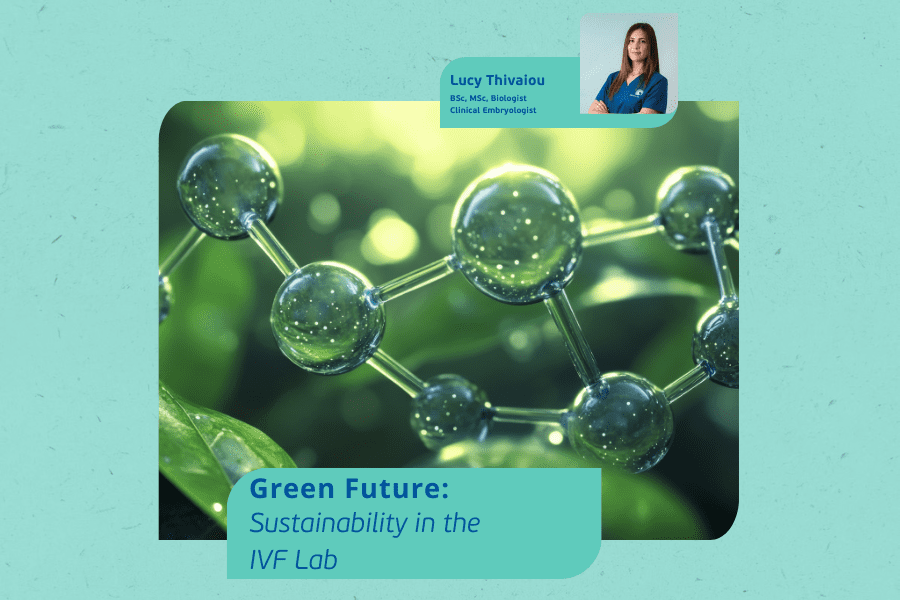
Lucy Thivaiou,BSc, MSc, Biologist, Clinical Embryologist
Globally, the healthcare waste produced is 5.9 million per year. Additionally, 4.4% is the carbon footprint contribution of the Healthcare system to the global net emissions with a significant portion of that coming from the laboratories of IVF clinics. While the healthcare sector is often considered as greener compared to other industries, this figure is projected to triple by 2050, potentially reaching 6 gigatons annually. Climate is changing because of human activity and this has a few impacts socially, economically, environmentally and mentally. IVF labs being the core of IVF clinics, and operating continuously, participate in greenhouse emissions effect with various ways, such as:
- High volumes of plastic waste plastic dishes – disposables – single use plastic heavily packaged sterile products
- Water over consumption
- Significant amounts of energy consumption by equipment operation consuming being left working rigorously or energy intense air handling systems
- Paper records & paper waste
- Use of gases LN2
- Transportation concerning lab fossil fuel dependent
A standard IVF procedure in a European clinic generates up to 1.7 kg of waste per cycle, with nearly 95% of this waste being not recycled. There is a critical need for effective waste management strategies to mitigate the environmental impacts of fertility treatments. These are the key points that reflect a comprehensive approach to enhancing sustainability in IVF laboratories, focusing on reducing environmental impacts while maintaining high-quality care.
🌱 IVF Lab Sustainability key points:
- Energy Efficiency: Implement energy-efficient equipment and practices to reduce overall energy consumption in the laboratory.
How? LED, automated lightning system, turn off computers.
- Minimising Waste: Reduce the use of single-use plastics and explore alternatives to minimise waste generation.
How? Using optimised protocols.
- Optimised Protocols: Streamline laboratory protocols to improve efficiency and reduce resource usage during IVF procedures.
How? Minimal use of fertility drugs to stimulate egg production/use less disposables.
- Recycling Programs: Establish recycling initiatives to properly handle materials that can be reused or recycled, thereby decreasing landfill contributions.
How? Recycling.
- Staff Training: Educate and train staff on sustainable practices to foster a culture of environmental responsibility within the lab.
How? Build sustainability mindset as a lab culture.
- Participation in certification programs: My Green IVF Lab or ISO 14001
- Sustainable Sourcing: Consider sustainability when sourcing materials and supplies, opting for environmentally friendly products when possible.
How? Cooperation with companies acquiring green policies.
- Monitoring and Assessment: Identify areas for improvement in sustainability efforts.
How? Evaluate and monitor laboratory practices.
- Minimise transportation: Online appointments, batching samples.
In Greece, IVF clinics are increasingly aware of the importance of sustainable practices, in part due to the country’s evolving regulatory framework. Greece’s National Waste Management Plan (NWMP), sets strict targets for reducing waste going to landfills, aiming for just 10% of total waste to be landfilled by 2030, significantly below the current EU average. This shift places pressure on all medical facilities, including IVF clinics, to adopt recycling programs. Also, the European Union’s Waste Framework Directive encourages member states to enhance recycling and recovery, setting a recycling target of 55% by 2025 and 65% by 2035. These guidelines are creating a favourable environment for the development of waste recycling companies in healthcare, and IVF clinics stand to benefit by partnering with these services to streamline their waste management.
IVF clinics can turn medical waste into a catalyst for change, combining the miracle of life with the mission of protecting the planet. For IVF clinics, sustainability isn’t just about regulatory compliance—it’s about staying ahead of the curve in a rapidly changing healthcare landscape! Patients are increasingly aware of the environmental impact of healthcare services, and sustainability practices could soon become a deciding factor in clinic choice.





